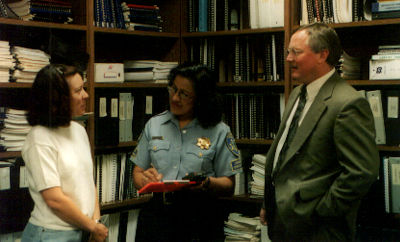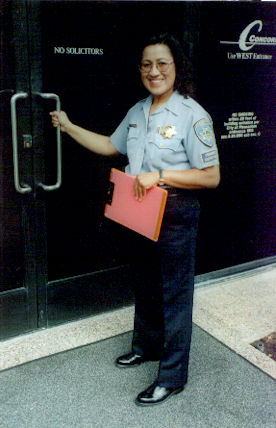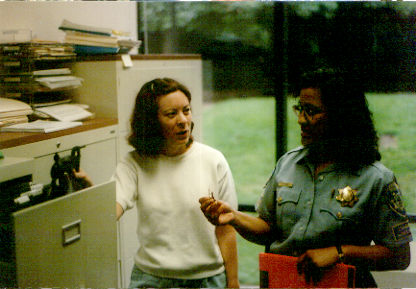Pleasanton Police Offers Security Programs for the Workplace
Pleasanton Police Offers Security Programs for the Workplace



Helping Pleasanton companies improve workplace security is an important goal of the Pleasanton Police Department's Business Security Program. Working with businesses of any size are Police Officer Michael Bradley and Community Service Officer Angela Calija of the Crime Prevention Unit. They come to businesses with a comprehensive, free program that includes conducting inspections and security checks inside a building, on the grounds, and in parking lots and garages, and giving a detailed presentation to employees.
Bradley, a five-year veteran of the PPD, has been on his current assignment since January. Calija is a veteran of more than 13 years with the PPD.
"The city of Pleasanton is a very safe community. A lot of burglaries and thefts are crimes of opportunity and to reduce that opportunity is what you need to do," says Bradley. "I like to tell people how they can reduce the risk of crime from happening, not necessarily the crime, but the risk, and that's important." The presentations are also opportunities for Bradley and Calija to explain to people why police do the things they do, and to answer questions about police procedures. Calija notes the value of coming to businesses in person to make presentations. It allows her to be more effective and answer people's specific questions about their concerns.
She agrees that Pleasanton is a very safe place, but notes that "people let their guard down" providing avenues for those crimes of opportunity. "Unfortunately, we often don't get calls from businesses to come out and do a security survey and presentation until there has been a problem there."
The Business Security Program is an excellent way for Hacienda businesses to link with the police department in working toward the workplace safety goals. That's why Police Chief Tim Neal strongly supports the department's program. "We can educate businesses to keep eyes open for and help them develop practices that will make it less likely their employees will become victims of crime. The police department is available for presentations for special on-site lunchtime programs which are very convenient for employees.
"The Hacienda Business Park is one of the premier parks in the area and an extremely valuable asset to Pleasanton and the Bay Area," he says. "There is no doubt that the police department considers Hacienda to be an important client and wants to actively work with property managers in the park."
The police department mailed letters recently to park property and facilities managers telling them about the program.
A wide variety of workplace security topics are discussed by Bradley and Calija. They include recognizing and reporting suspicious people, securing personal belongings, deterring identity and computer theft, securing checks and mail, using employee identification badges, working after hours, understanding vehicle and parking lot security and marking property.
The officers have given us a few examples of the topics covered in their comprehensive presentations:
Knowing Your Co-workers
Bradley says that in the workplace it's important to create a sense of well-being by knowing the people who work around you, especially in large office buildings with hundreds of people.
He emphasizes the importance of being aware of unauthorized people who may be in an office. He notes that many thefts are committed by people who were free to roam through buildings and offices without being asked what they wanted. "When you see someone who looks out of place or doesn't have an employee identification badge, then you would let someone know or approach the person and ask them what is their business there."
Calija also recommends security passes as a way for large companies to maintain security. It's easier to know who should be in a building or office when employees have identification badges or tags. Requiring these to be worn at all times eliminates guesswork.
Identity Crisis
One crime which is increasing in the U.S. is the theft of credit cards, personal and business checks, driver's licenses and Social Security numbers. Once taken, a thief can use these items to assume the identity of the victim to apply for new credit cards as well as creating financial havoc in other ways. This crime has come to be known as "identity theft."
In their presentations, Calija and Bradley explain to employees the consequences that arise when these are stolen and how to prevent the theft from ever occurring. Calija suggests that if you have those items in a purse to keep it in a locked desk drawer rather than on the floor under the desk. For men, remove wallets from coat pockets before hanging them up in a cubicle.
Site Security Issues
Teaching people to understand crimes of opportunity helps them make important changes in their business settings. For example, laptop computer theft is a growing crime because of the ease and portability of the equipment and the high prices they bring when they are resold. Securing a laptop to a desk or placing it in a locked drawer or locker can deter this. Removing from your car any laptops, along with cell phones, pagers, and other electronic items, is important as well.
Leaving doors propped open can be inviting trouble. Calija has performed security checks on businesses and seen back doors propped open with rocks. "Maybe people are outside smoking and they forget to remove the rock when they go back inside, but they leave a way for someone who shouldn't be there to come into the business."
Procedural Safety
Often, employees aren't aware of the consequences of their procedures. For example, Calija says that some businesses have their checks and mail in boxes that are not secured. "People can just walk in and steal paychecks. We try to get the company to secure mail with a key lock to the mail system, but not to use something that's open where you can walk up and grab what's there."
Many businesses are unaware of another practice that puts their mail at risk. "A lot of business know that the mail carrier will come in between three and four and they put the mail at the back door, completely unsecured. Checks can be stolen and washed and the thief can put a fraudulent name on it as the recipient and deposit it in their checking account."
One way to help prevent check theft is to limit who has access to those business checks. Calija says that she knows many companies that authorize the pre-signing of checks and then have a stack of them in an unsecured bottom desk drawer, another potential problem.
Business After Hours
Working after hours in a building has its own issues. The PPD's security presentation gives practical suggestions for helping to ensure safety.
"If you will be working after hours, let other people in the building and at home know what time you will be leaving," says Bradley. "Keep the office and halls well lit."
He also suggests moving your car up closer to the building and, if possible, he recommends that employees "try to work with someone else after hours."
Other Programs and Services
That's just a small sampling of the information that the PPD can provide. They also have a separate program on robbery awareness and handling bomb threats in an office environment. These presentations are frequently given to banks that request them, but are available to any business. The PPD's library of crime prevention videotapes is also available to businesses.
No videotape, however, will be able to take the place of a site inspection and presentation from the two officers. Their personalized attention means that each presentation is custom tailored to that business.
For more information on having a security program presentation at your business, contact Police Officer Michael Bradley at (925) 931-5233 or via e-mail at mike.bradley@ci.pleasanton.ca.us, or Community Service Officer Angela Calija, (925) 931-5232 or angela.calija@ci.pleasanton.ca.us.
The Hacienda Owners Association also has a variety of safety and security materials available. Call the Hacienda Security Hotline at (925) 734-6552 for information or access www.hacienda.org.
Photo: Hacienda Owners Association staff discusses crime prevention with Officer Angela Calija and Pleasanton Police Chief Tim Neal.
Also in this issue...
- Mobileum Brings Freedom to Wireless Commerce
- RJA is Coming Full Circle
- Business Bits
- Executive Profile — Bernie Schneider, Intira Corp.
- SafeAmerica Credit Union Building a New Headquarters in Hacienda
- Pleasanton Police Offers Security Programs for the Workplace
- Pleasanton's Technology Marketplace is the Hottest Tech Showcase Event
- S.F. Shakespeare Festival Comes to Amador Valley Park
- GASIT Golf Tournament Lets Players Tee Off to Support Youth Scholarships
- Hacienda Index




